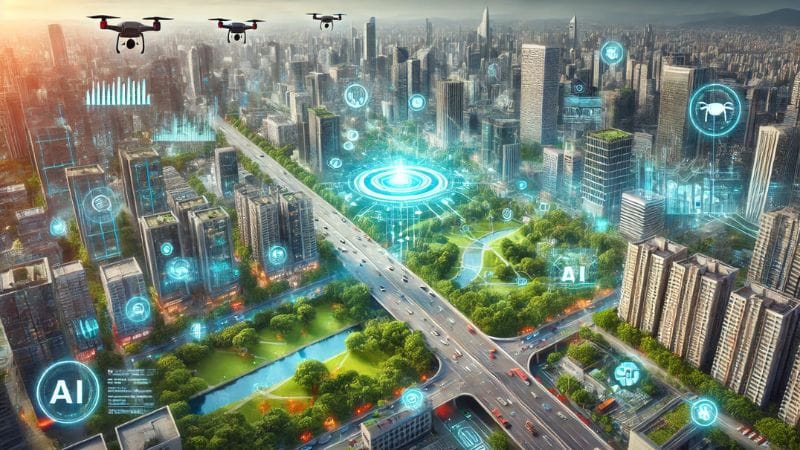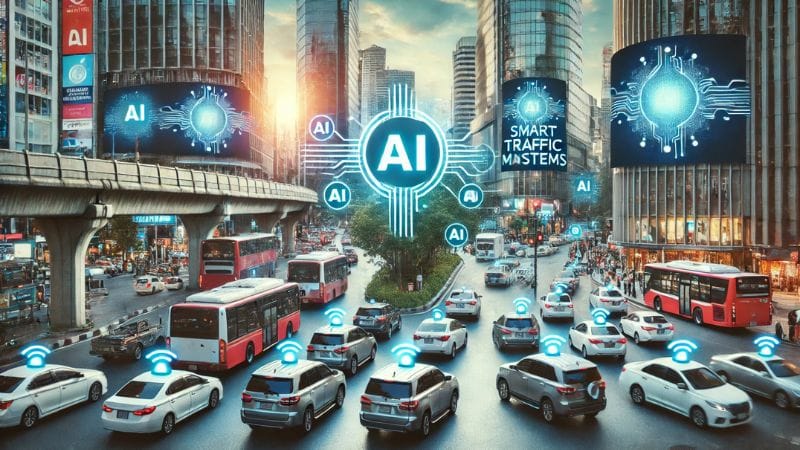Urban planning is a critical discipline that shapes the development of cities, affecting aspects from transportation systems and housing to public spaces and environmental sustainability.
As urban populations swell and the complexity of city management intensifies, the need for innovative, efficient solutions in urban area becomes increasingly crucial.

Artificial Intelligence (AI) stands out as a transformative force in this arena, offering tools and methodologies that can enhance the planning and management of urban environments significantly.
AI in urban areas involves the use of machine learning, data analytics, and computational modelling to tackle challenges in urban development.
The transition from traditional, often manual, planning methods to sophisticated AI-driven approaches marks a pivotal evolution in the conceptualization and management of urban environments.
By employing AI technologies, urban planners can analyze vast amounts of data, predict future trends, and make informed, data-driven decisions.
For more Article related to architecture, Click here.
Artificial Intelligence Technologies Shaping Urban Areas
Urban planning is being reshaped by several AI technologies:
- Machine Learning: These algorithms learn from data to make predictions, helping planners understand complex patterns such as traffic flows or housing demands.
- Neural Networks: Useful in image recognition, these can be applied to satellite images to classify land use and monitor urban expansion.
- Predictive Analytics: These tools forecast changes based on existing trends, aiding in infrastructure and resource planning over the long term.
Examples of tools integrating these AI technologies include Urban Footprint and City Engine.
It will help to simulate different urban development scenarios, allowing planners to visualize the potential impacts of various strategies before they are implemented.
Case Studies and Real-World Applications
AI’s application in urban areas can be illustrated through various global case studies:
- Traffic Management: Cities like Toronto and Singapore leverage AI to optimize traffic flow. Machine learning algorithms analyze data from traffic cameras and sensors to predict and alleviate congestion patterns effectively.
- AI-Assisted Zoning: In Los Angeles, AI algorithms analyze geographical data to suggest optimal land use allocations, streamlining the zoning processes.
- Environmental Impact Assessments: AI-powered tools predict the environmental impacts of proposed projects, enabling more sustainable urban development decisions.
These examples demonstrate how AI not only enhances existing processes but also enables.
A level of predictive planning previously unattainable, significantly improving the efficacy and precision of urban planning.
The Benefits of AI in Urban Planning
The integration of AI in urban planning offers numerous advantages:
- Efficient Resource Management: AI facilitates optimal resource allocation, ensuring that utilities and services are managed efficiently.
- Improved Public Safety: Predictive analytics can identify high-risk areas for crime or accidents, allowing for preemptive safety measures.
- Enhanced Quality of Life: AI optimizes urban elements like traffic and public services, significantly improving the livability of cities.
AI also promotes more inclusive planning by integrating community input through analysis of social media data and participatory apps, democratizing the urban planning process.
Ethical Considerations and Challenges
Despite its benefits, the use of AI in urban planning is not without ethical considerations:
- Privacy Concerns: The utilization of personal data raises significant privacy issues that must be addressed through stringent data governance.
- Bias in AI Algorithms: AI systems may inadvertently perpetuate existing biases, leading to unequal development outcomes unless carefully managed.
Urban planners must address these challenges with a robust ethical framework.
The proactive data governance policies to ensure fairness and protect residents’ privacy.
The Future of AI in Urban Planning
The future of urban planning is closely tied to advancements in AI.
Emerging developments in AI could lead to more adaptive, real-time urban management systems capable of dynamically responding to city conditions and residents’ needs.
Urban planners will increasingly need to acquire skills in data science and AI to remain effective and innovative in their roles.
Conclusion
AI possesses the potential to fundamentally transform urban planning, making it more efficient, predictive, and participatory.

As urban areas continue to expand and evolve, embracing AI in urban planning processes is essential for achieving sustainable and resilient urban development.
For professionals involved in urban development or those interested in the nexus of technology and city planning, now is an opportune time to engage with AI technologies.
Upgrading skills, participating in industry discussions, or implementing AI-driven tools are all viable pathways to contribute to and shape this transformative shift in urban planning.


